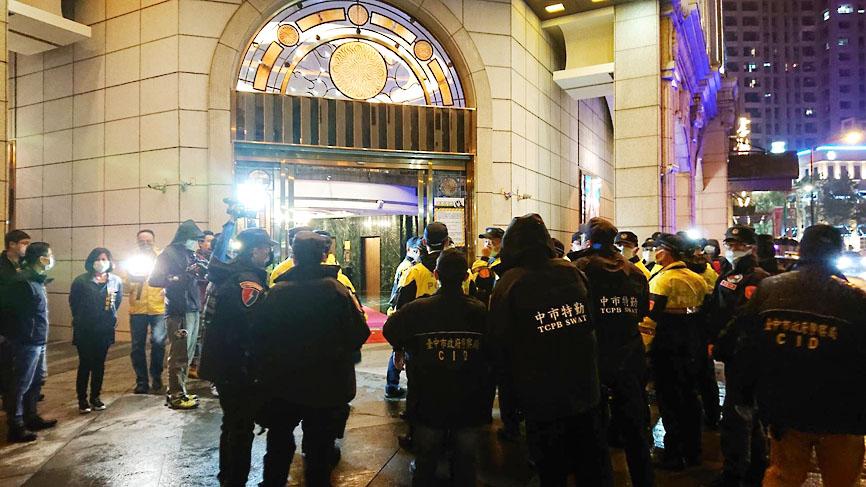The Taichung City Government is asking all hostess bars and dance halls to suspend operations as part of an administrative order from the Central Epidemic Command Center (CECC), the city said yesterday.
The CECC on Wednesday issued the order after a hostess in Taipei tested positive for SARS-CoV-2, the virus that causes COVID-19.
Individuals or establishments that breach the order face fines of NT$3,000 to NT$15,000, in accordance with the Communicable Disease Control Act (傳染病防治法), the municipality said.

Photo courtesy of the Taichung City Government
Taichung Mayor Lu Shiow-yen (盧秀燕) said that similar businesses — KTVs, saunas, bars, nightclubs, “special service” cafes and arcades — are to continue to follow prevention guidelines, such as wearing masks, taking temperatures and observing social distancing.
The government is also enforcing new regulations for these establishments to record the names and telephone numbers of clients upon entry.
Lu said that the new regulations are being put in place not just because of the hostess case in Taipei, but also because of similar cases in the past.
The high client turnover at these businesses makes it difficult to track individual customers, adding to the difficulty of disease prevention and increasing the risk of local cluster infections, Lu said.
The city recognizes the concerns from the management of these businesses, but it asks them for their understanding and compliance in these trying times, Lu said.
Businesses must take special measures to maintain public health during the COVID-19 pandemic, Lu added.
Meanwhile, hostess bars on Wednesday closed early for establishment-wide disinfection after the Taipei Department of Health visited regarding the employee.
Hostesses typically come from third-party companies and do not have standing contracts with the hostess bars themselves, a source said, adding that the hostess who tested positive had been dispatched to other bars.

Chinese spouse and influencer Guan Guan’s (關關) residency permit has been revoked for repeatedly posting pro-China videos that threaten national security, the National Immigration Agency confirmed today. Guan Guan has said many controversial statements in her videos posted to Douyin (抖音), including “the red flag will soon be painted all over Taiwan” and “Taiwan is an inseparable part of China,” and expressing hope for expedited reunification. The agency last year received multiple reports alleging that Guan Guan had advocated for armed reunification. After verifying the reports, the agency last month issued a notice requiring her to appear and explain her actions. Guan

GIVE AND TAKE: Blood demand continues to rise each year, while fewer young donors are available due to the nation’s falling birthrate, a doctor said Blood donors can redeem points earned from donations to obtain limited edition Formosan black bear travel mugs, the Kaohsiung Blood Center said yesterday, as it announced a goal of stocking 20,000 units of blood prior to the Lunar New Year. The last month of the lunar year is National Blood Donation Month, when local centers seek to stockpile blood for use during the Lunar New Year holiday. The blood demand in southern Taiwan — including Tainan and Kaohsiung, as well as Chiayi, Pingtung, Penghu and Taitung counties — is about 2,000 units per day, the center said. The donation campaign aims to boost

The Kaohsiung Tourism Bureau audited six hotels in an effort to prevent price gouging ahead of Korean band BTS’ concert tour in the city scheduled for Nov. 19, 21 and 22 this year. The bureau on Friday said that the audits — conducted in response to allegations of unfair pricing posted on social media — found no wrongdoing. These establishments included the local branches of Chateau de Chine, Hotel Nikko, My Humble House, and Grand Hai Lai, it said, adding that the Consumer Protection Commission would have penalized price gougers had the accusations been substantiated. The bureau said the Tourism Development Act

BACK TO WINTER: A strong continental cold air mass would move south on Tuesday next week, bringing colder temperatures to northern and central Taiwan A tropical depression east of the Philippines could soon be upgraded to be the first tropical storm of this year, the Central Weather Administration (CWA) said yesterday, adding that the next cold air mass is forecast to arrive on Monday next week. CWA forecaster Cheng Jie-ren (鄭傑仁) said the first tropical depression of this year is over waters east of the Philippines, about 1,867km southeast of Oluanpi (鵝鑾鼻), and could strengthen into Tropical Storm Nokaen by early today. The system is moving slowly from northwest to north, and is expected to remain east of the Philippines with little chance of affecting Taiwan,